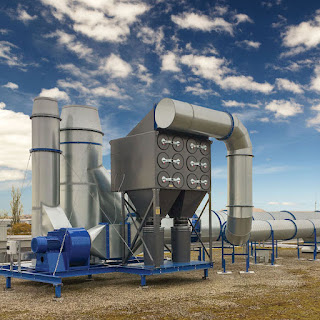Breathing Life into Industry: The Importance of Factory Ventilation
In the bustling world of manufacturing and industrial processes, one often overlooked aspect is factory ventilation. Yet, it's a crucial element that can significantly impact not only the health and well-being of workers but also the efficiency and longevity of machinery. In this blog post, we'll explore the vital role of factory ventilation and why it deserves more attention than it typically receives.
1. Worker Health and Safety
Perhaps the most critical aspect of factory ventilation is its role in maintaining a safe and healthy working environment. Industrial processes often release dust, fumes, and other airborne contaminants that can be harmful when inhaled. Proper ventilation systems help remove these pollutants, reducing the risk of respiratory issues and ensuring that employees can breathe clean air.
2. Temperature Control
Factory environments can become extremely hot, especially in facilities with heavy machinery and equipment. Adequate ventilation helps regulate temperature by expelling hot air and bringing in cooler air from the outside. This not only improves worker comfort but also prevents overheating of machinery, which can lead to breakdowns and costly repairs.
3. Humidity Regulation
Some industrial processes produce excess humidity, which can lead to corrosion, mold growth, and reduced product quality. Ventilation systems can help control humidity levels, preserving both equipment and products.
4. Odor Elimination
Certain manufacturing processes can generate unpleasant odors that affect the working environment and employee morale. Effective ventilation helps remove these odors, creating a more pleasant workplace.
5. Improved Energy Efficiency
Properly designed ventilation systems can enhance energy efficiency in factories. By strategically moving air and optimizing temperature control, companies can reduce their energy consumption and lower operational costs.
6. Compliance with Regulations
Many industries are subject to strict regulations regarding indoor air quality and employee safety. Maintaining an efficient ventilation system is not only responsible but also ensures compliance with these regulations, reducing the risk of fines and legal issues.
7. Machinery Longevity
Well-ventilated factories help extend the life of machinery and equipment. Dust and debris buildup can cause premature wear and tear, leading to costly repairs or replacements. Clean, well-ventilated environments reduce the risk of this damage.
8. Enhanced Product Quality
In industries where precision is paramount, like electronics manufacturing or pharmaceuticals, maintaining a controlled environment with proper ventilation is essential for ensuring the quality and reliability of the products being produced.
In conclusion, factory ventilation is not merely an afterthought but a fundamental component of industrial operations. It contributes to worker health and safety, protects machinery, improves energy efficiency, and ensures compliance with regulations. As industries continue to evolve, investing in state-of-the-art ventilation systems becomes not only a matter of practicality but also a testament to a company's commitment to the well-being of its employees and the longevity of its operations.





Comments
Post a Comment